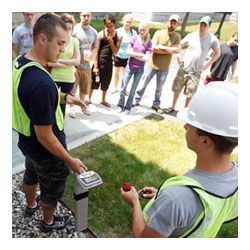Student's Research Will Improve Underground Utility Mapping Safety
Federal safety initiative draws students from different majors
By David W. Smith, Staff
October 2012, Norwich University Office of Communications
 If you hit cable television, phone, sewer or water lines, the result can be disastrous. If you hit a power or gas line, it can be deadly.
If you hit cable television, phone, sewer or water lines, the result can be disastrous. If you hit a power or gas line, it can be deadly.
Four Norwich University students have joined a major effort to improve safety for anyone attempting a dig, from a major excavation to installing a mailbox. The students, who come from a variety of academic tracks, spent the summer helping local companies with their underground utility mapping, and studying how to do it better. It’s the type of real-world experience emphasized at Norwich, the country’s oldest private military college.
“It makes me realize how complex it is for utilities,” said Tyler Hermanson, a geology major from Gilford, Vt. “It’s just like a maze underground.”
The students were paid through a federal Pipeline and Hazardous Materials Safety Administration grant, administered by Vermont, to test out a variety of methods for locating utility lines. These ranged from old-fashioned surveyors’ techniques to ground-penetrating radar and electromagnetic field generators that work in conjunction with GPS mapping software. Not only were they able to help local Vermont utilities – mostly propane companies – get a better handle on where their lines were located, but students created reports based on their experiences for a broader information clearinghouse and call center. Dig Safe covers all New England and puts homeowners and contractors in contact with utilities. Vermont law requires anyone conducting an excavation to provide notification.
Civil Engineering Prof. Adam Sevi, one of two professors who oversaw the project, praised the practical knowledge students gleaned from the work. In addition to the skill of locating, they learned how owners of utilities organize and record information about installations.
“Every piece of infrastructure has somebody managing it, and that’s an important job,” said Sevi.
account_balanceMore About This School
